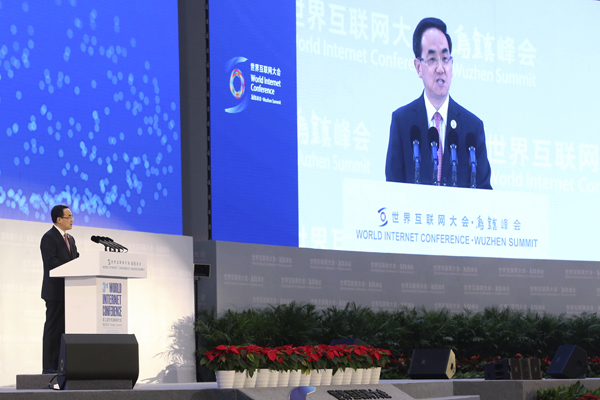
- Home
- Media Center
-
Events
- Wuzhen Summit
- Regional Forums
- Practice Cases of Jointly Building a Community with a Shared Future in Cyberspace
- World Internet Conference Awards for Pioneering Science and Technology
- The Light of Internet Expo
- Straight to Wuzhen Competition
- Global Youth Leadership Program
- WIC Distinguished Contribution Award
- Membership
- Research & Cooperation
- Digital Academy
-
Reports
- Collection of cases on Jointly Building a Community with a Shared Future in Cyberspace
- Collection of Shortlisted Achievements of World Internet Conference Awards for Pioneering Science and Technology
- Reports on Artificial Intelligence
- Reports on Cross—Border E—Commerce
- Reports on Data
- Outcomes of Think Tank Cooperation Program
- Series on Sovereignty in Cyberspace Theory and Practice
- Other Achievements
- About WIC
- 中文 | EN

World Internet Conference closes in E China

Xu Lin, minister of the Cyberspace Administration of China, delivers a speech at the closing ceremony of the third World Internet Conference (WIC) in Wuzhen, East China's Zhejiang province, Nov 18, 2016. [Photo by Feng Yongbin/chinadaily.com.cn]
HANGZHOU - The third World Internet Conference closed Friday in Wuzhen in East China's Zhejiang province.
A number of emerging technologies, including Telsa's Self-Driving Vehicle and Huawei's Kirin 960 chipset, were released at the conference, which was themed "Innovation-driven Internet Development for the Benefit of All -- Building a Community of Common Future in Cyberspace."
More than 1,600 guests, including state leaders, from over 110 countries and regions attended the conference. The conference consisted of 16 forums covering the economy, culture, governance, international internet cooperation and other themes.
"With innovation in its genes, the internet has become an important driver for economic and social development," said Xu Lin, director of Cyberspace Administration of China.
Xu also stressed interconnection and shared governance in cyberspace, and said it is the common responsibility for international society to maintain internet security.

The World Internet Conference (WIC) was established as an international organization on July 12, 2022, headquartered in Beijing, China. It was jointly initiated by Global System for Mobile Communication Association (GSMA), National Computer Network Emergency Response Technical Team/Coordination Center of China (CNCERT), China Internet Network Information Center (CNNIC), Alibaba Group, Tencent, and Zhijiang Lab.





